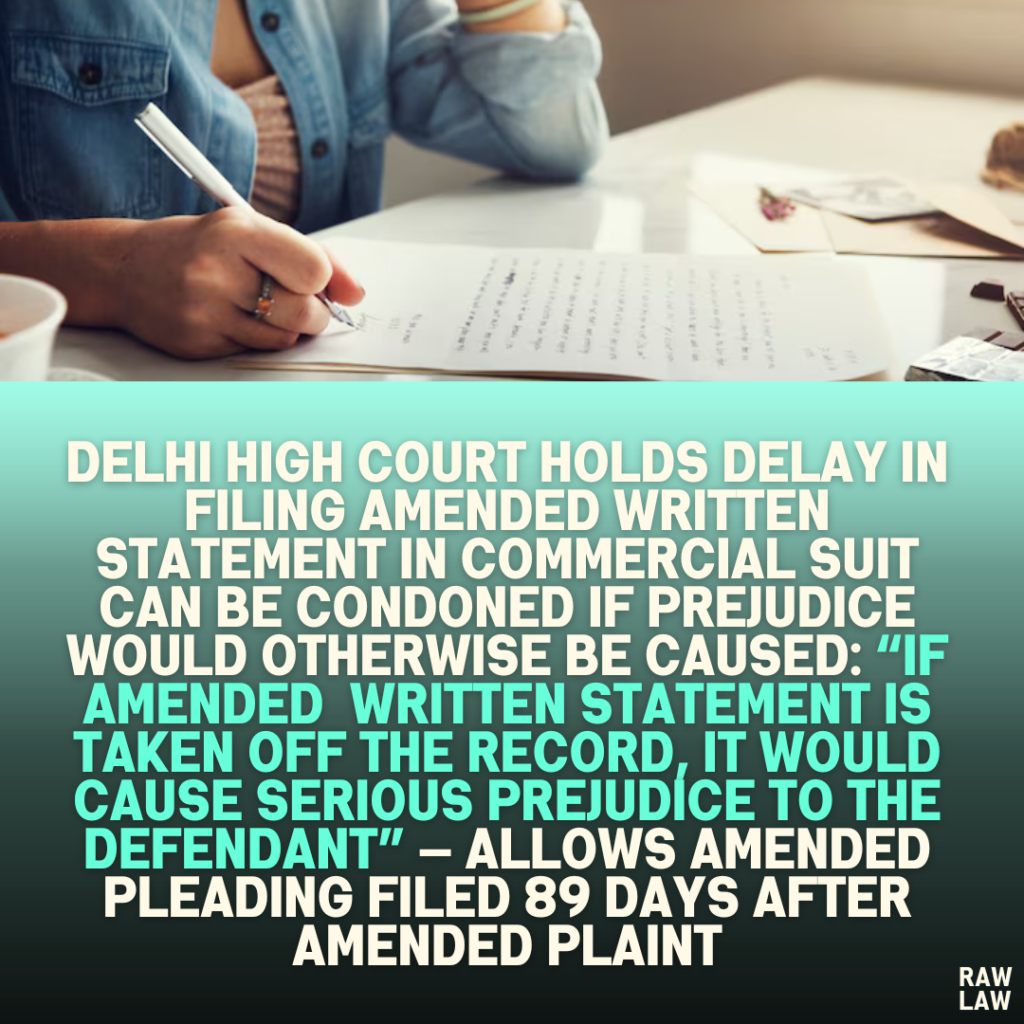Court’s Decision
The Delhi High Court allowed the petitioner’s plea to take the amended written statement on record despite a delay in filing. The Court held that although timeframes for filing pleadings in commercial disputes are mandatory, a degree of flexibility may be exercised when the amended written statement is filed within a reasonable period — in this case, 89 days from the date the amended plaint was filed. The Court imposed a cost of ₹10,000 on the petitioner for the delay and directed compliance with a prior cost order of ₹25,000.
Facts
The petitioner was the defendant in a commercial suit originally filed on 23.04.2019. She had filed her written statement on 06.05.2023, within the statutory timeframe provided under Order VIII Rule 1 CPC for commercial disputes.
Subsequently, the plaintiff moved a second application seeking amendment of the plaint, which was allowed by the Trial Court on 29.11.2024. The plaintiff filed the amended plaint on 18.12.2024, reducing the claim from ₹38,07,100/- to ₹28,28,784/- and deleting two out of three defendants.
The Trial Court directed the petitioner (defendant) to file an amended written statement by the next date of hearing, i.e., 17.01.2025. However, the petitioner failed to do so within this timeframe and moved an application for extension of time on 28.02.2025, along with a prayer for condonation of delay. This application was dismissed by the Trial Court on 16.04.2025. The petitioner challenged this order before the High Court.
Issues
- Whether the delay in filing the amended written statement should be condoned.
- Whether the dismissal of the application for condonation of delay was justified under the Commercial Courts Act and CPC provisions.
Petitioner’s Arguments
- The petitioner restricted the relief in the present petition only to the acceptance of the amended written statement and did not press the challenge to the dismissal of the Order XI Rule 14 CPC application.
- It was argued that although there was a delay, the amended written statement was filed within 89 days from the date the amended plaint was filed.
- The petitioner urged that rejecting the amended written statement would cause serious prejudice.
Respondent’s Arguments
- The respondent did not object to the acceptance of the amended written statement but requested that exemplary costs be imposed to avoid delay in proceedings.
Analysis of the Law
- The Court examined the scope of Order VI Rule 18 CPC, which applies where a party who has been granted leave to amend fails to amend within the stipulated period.
- The Court clarified that in the present case, the amendment was sought by the plaintiff, not the defendant, and hence Rule 18 CPC would not apply to the defendant’s amended written statement.
- The Court differentiated between the initial written statement (governed by the strict 120-day timeline under Order VIII Rule 1 CPC) and a written statement filed in response to an amended plaint, which may allow some flexibility.
- The Court noted that while such timeframes are binding, they may be extended upon showing sufficient cause, especially if the amended written statement is filed within a reasonable period.
Precedent Analysis
The judgment did not cite any specific precedent but relied on interpretation of Order VI Rule 18 and the principles underlying Order VIII Rule 1 CPC as applicable to commercial suits.
Court’s Reasoning
- The Court held that the strict timelines under Order VIII Rule 1 CPC apply when the defendant first enters appearance after service of summons — not to a written statement filed in response to an amended plaint.
- It reasoned:
“If amended WS is taken off the record, it would be causing serious prejudice to the defendant, particularly, when the amended written statement was filed within a period of 89 days…” - It accepted that the delay, although not condonable under the exact 30-day extension granted by the Trial Court, was still within a permissible total of 120 days from the date of the amended plaint.
Conclusion
The Delhi High Court set aside the order of the Trial Court refusing to accept the amended written statement. It permitted the written statement to be taken on record subject to a cost of ₹10,000 to be paid to the respondent on the next date of hearing. Additionally, it directed that a previously imposed cost of ₹25,000 be deposited with the concerned fund within two weeks.
Implications
- The judgment reinforces that procedural rigour in commercial disputes under the CPC may still accommodate a reasonable and bona fide delay, especially where the consequence of striking off pleadings would cause substantial injustice.
- It draws a distinction between timelines applicable to original pleadings and those applicable to responses to amended pleadings.
- The order provides clarity on how courts may handle delays in filing amended written statements in commercial suits, particularly when the plaintiff initiates the amendment.



